Market uncertainty is as thick as San Francisco fog…
You knew that August was going to be a trickier month than normal, but I doubt you were betting on a 1,000 point pullback in the Dow Industrials. The pillars of the market finally succumbed to the growing worries of China growth, falling oil prices and FOMC rate-hike uncertainty. The weak internals of the stock market could no longer hold it up, and the break was swift and on massive selling volume. The markets did shave half of their recent losses in a bounce Thursday and Friday, but unfortunately, the buying volumes late in the week did not offset the strength of the selling earlier in the week. The uncertainties in the market will be difficult to clear this time around… China is a much bigger problem than Greece, and the Fed’s playbook now looks as predictable as a Wes Andersen screenplay. “V” bottoms in times as uncertain as these are rare, there is too much volatility and too many short- and mid-term negative returns across the asset classes to not think we will retest the lows. Also adding to worries is September is seasonally the weakest month of returns on the equity calendar; so enjoy the safety of your extra cash, turn up the Green Day, and “Wake me up when September ends”.
JPMorgan’s Trading Desk weekly commentary sums up last week well…
Markets take on a life of their own. The S&P 500 swings and gyrations remain dramatically incongruous w/changes in underlying fundamentals and while that statement provides cold comfort for the legions of investors sitting on steep losses it does help put the recent volatility into context. Subtle but dramatic shifts in market structure, stale reactionary playbooks (in particular the specious conflation of the SHCOMP w/Chinese growth and the price of oil w/ global economic activity), thin liquidity and attendance, and a vacuum of news have all contributed to the sharp swings of the last few weeks. To be sure, the fundamental landscape is undergoing some adjustment but the pace is much more evolutionary and gradual than one would think simply by observing the SPX in the latter part of August. The real damage inflicted on stocks can’t be ignored – no matter how stale and unjustified the Chinese concerns may be they had a material effect on prices. However, despite deafening claims to the contrary and panicked behavior, a 2008-like crisis isn’t in the offing. Stock bulls should be comforted by fundamentals much stronger than many appreciate and investor sentiment more negative than it’s been in years
What was the damage? -14.4% recent high to the lows on Monday, followed by a 9.7% bounce…
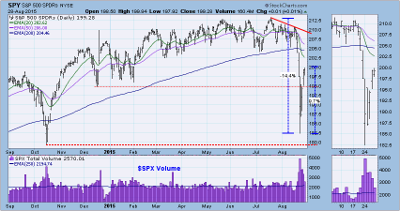
In the last two weeks the stock market put on quite a show. Many months of sideways boredom was finally ended with a dramatic breakdown and a scary drop of -14.4% (intraday for (NYSE:SPY)) from the all-time high in July. From that low, SPY then rebounded nearly +10%. On the chart above we can see that volume contracted on every day of the rebound, and on Friday the advance stalled. Note that the 50 EMA is still above the 200 EMA, which by my definition means that this index is still in a bull market, but keep in mind that, as long as price remains below those EMAs, they will continue to converge and the downside crossover will take place. The 50/200 EMA separation for the S&P 500 Equal Weight ETF (RSP) is only +0.09, so a downside crossover (Death Cross) is virtually guaranteed next week, unless, of course, the rally continues its furious ascent
A little data mining shows it is tough to make money when the Death Cross happens so close to the highs…
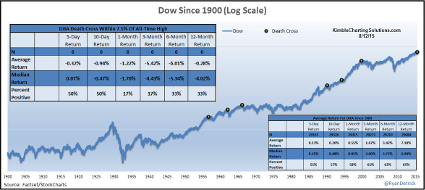
Sorting the August returns through Friday shows the month’s damage has also taken most YTD returns negative. Even the top group, Biotech, swallowed a bitter pill this month…
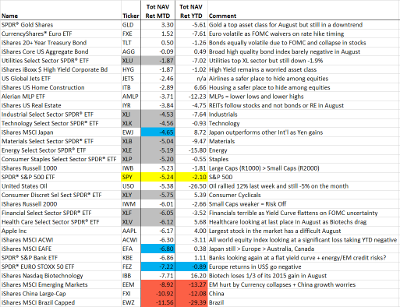
But even with all the gloom and doom, a full out Bear Market seems difficult to achieve according to these stats from Citigroup…
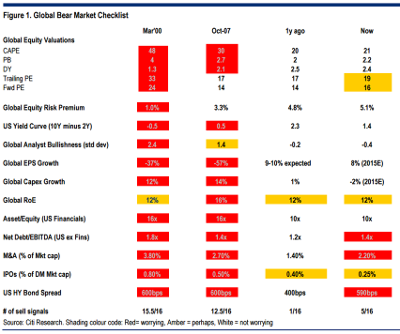
But not a time to throw caution into the wind and BUY blindly according to Allianz’s chief economic advisor, Mohamed El-Erian…
“Low enough means a lot lower than here because they’ve been inflated well beyond fundamentals by central bank policies, so in order to bring people back in you’ve got to overshoot the fundamentals on the down side to induce people back in,” he told CNBC‘s “Squawk Box.”
“We are still well above what would be warranted by fundamentals. There has been this enormous faith in central banks, and that faith in central banks means we have borrowed returns and growth from the future, hoping that central banks will be able to hand off to higher growth. That has not happened.”
What are the BIG risks Portfolio Managers are most focused on?
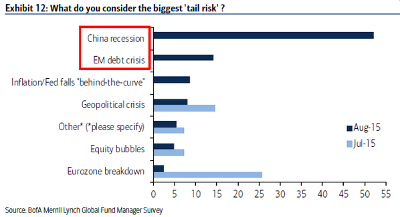
Worries about the Fed have increased as confusion surrounding the first rate hike have risen. But according to the Fed’s (Fischer) comments over the weekend, the FOMC still plans on raising rates soon…
“Given the apparent stability of inflation expectations, there is good reason to believe that inflation will move higher as the forces holding inflation down—oil prices and import prices, particularly—dissipate further,” Fed Vice Chairman Stanley Fischer said Saturday at the Federal Reserve Bank of Kansas City’s annual economic symposium.
Ditto for the comments from the Cleveland Federal Reserve Bank President, Loretta Mester…
“I want to take the time I have between now and the September meeting to evaluate all the economic information that’s come in, including recent volatility in markets and the reasons behind that,” Ms. Mester said. “But it hasn’t so far changed my basic outlook that the U.S. economy is solid and it could support an increase in interest rates.”
The Fed must still be focused on the U.S. job situation, which continues to improve…
@Fullcarry: “Jobs Hard to Get” less “Jobs Plentiful” hits new cycle lows… great news if it weren’t August
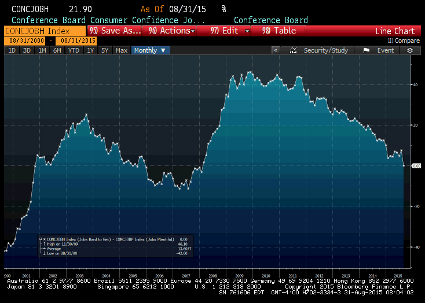
Meanwhile, international finance ministers continue to bait the Federal Reserve…
“The U.S. should move quickly to raise interest rates to reduce global uncertainty and speculation in financial markets world-wide”, Indonesia’s finance minister said Wednesday. “It’s better for the U.S. to make a decision,” Bambang Brodjonegoro, finance minister of the world’s fourth most-populous country, said in an interview. “Because what makes the financial markets volatile is the uncertainty.”
Focusing more on Emerging Market equities, Mark Mobius also urges caution…
Mark Mobius says investors should hold off from buying developing nation shares as a rebound from six-year lows will be shortlived amid widening price swings. “We have a little bit to go before we see stabilization, but volatility will remain,” Mobius, chairman of the emerging markets group at Franklin Templeton Investments, said in an interview with Bloomberg Television. “We are sitting on cash.”… Investors should wait for markets to stabilize instead of rushing to buy, Mobius said. Chinese policy makers could use monetary and fiscal policies, including easing banks’ reserve requirements, to boost equities, he said.
The new news over the weekend out of China was that it would put its Plunge Protection Team in timeout, and will no longer try to support its stock markets. Instead it will focus on punishing those profiting from shorting the markets…
China’s government has decided to abandon attempts to boost the stock market through large-scale share purchases, and will instead intensify efforts to find and punish those suspected of “destabilizing the market”, according to senior officials. For two months, a “national team” of state-owned investment funds and institutions has collectively spent about $200bn trying to prop up a market that is still down 37 percent since its mid-June peak…
Last week’s equities collapse, which prompted a rout in global markets, was partly blamed on authorities’ apparent decision to refrain from the share purchases they had been making since early July. After standing on the sidelines for more than a week, the government resumed large-scale stock-buying in the last hour of trade on Thursday. This helped to lift the Shanghai benchmark index from a small loss to end the day up more than 5 percent. The market rose by almost 5 per cent again on Friday. Traders and officials said the latest intervention was aimed at providing a “positive market environment” in preparation for a big military parade this week to celebrate the 70th anniversary of the “victory of the Chinese people’s war of resistance against Japanese aggression”. Senior financial regulatory officials insist that this was an anomaly, and that the government will refrain from further large-scale buying of equities.
Instead, authorities are planning to sharpen their focus on investigating and punishing individuals and institutions they believe have taken advantage of the state bailout to make profits or have obstructed the government’s attempts to shore up the market.
The Tianjin explosion highlighted the dangers of growing from an emerging to a developed economy too quickly…
The catastrophe in Tianjin has stunned a nation inured to living with one of the worst industrial safety records in the world. By the government’s own count, more than 68,000 people were killed in such accidents last year — nearly 200 every day, most of them poor, powerless and far from China’s boom towns.
But the Aug. 12 blasts at Rui Hai were different, because they occurred so close to middle-class neighborhoods in one of China’s most prosperous cities, a modern metropolis of 15 million just a half-hour ride from Beijing on gleaming high-speed trains. And they unfolded nearly in real time online, with dramatic video shared widely across social media before censors could stop it. Criticism of the party’s management of the economy had already been on the rise, with growth at its slowest pace in a quarter-century and the stock market reeling since early summer. Now the explosions have prompted broader questions about whether party officials who operate with few checks on their authority can pursue development without endangering public health and safety.
China may not be a big growth engine for the U.S. economy, but it is for the World economy…
As China’s markets fall and drag down global equities, the underlying concern is undoubtedly how much a slowdown in the Chinese economy will affect the rest of the world. Since the 2008 global financial crisis, China has notably emerged as one of the twin engines of world growth. China has contributed as much to world GDP growth as the U.S. in the past decade and a half, and even more than the world’s biggest economy since the 2008 financial crisis, according to the IMF. Indeed, the IMF projects that China will generate around double what the U.S. contributes to world output until the end of the decade. Together, the U.S. and China are expected to generate as much world output as the rest of the world put together.
Prior to China integrating with the world economy, the U.S. was the biggest and sole engine of global growth as it accounted for nearly a quarter of world GDP, based on market exchange rates. So, it’s the rapid growth of China, which rose from accounting for a mere 2% of world GDP in 1995 to around 15% now, that helped the world economy grow so quickly in the 2000s. As China slows from the nearly 10% growth rate that it clocked in the first three decades of its reform period, which began in 1979, to what is thought to be a more sustainable 7% or so, the world economy is likely to slow with it. The main areas where the impact will be felt would include not only commodities, but also consumer goods, including luxury goods.
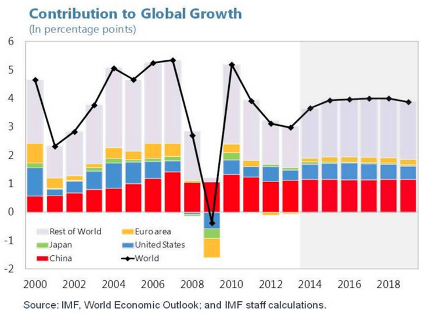
Some charts on the importance of China…
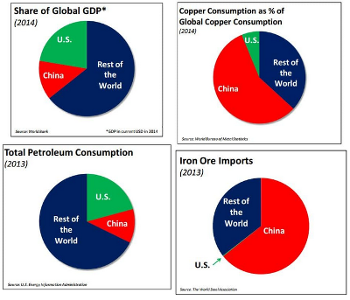
And more on their consumption of global commodities…
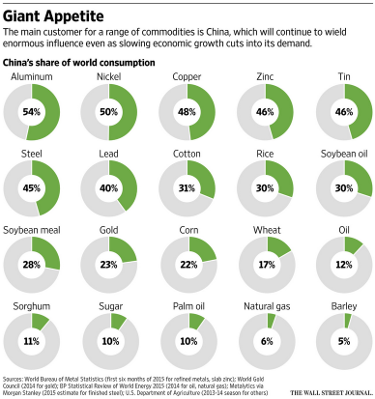
While the world was concerned about the rate of price decline in Crude Oil, it put in a multiple sigma price move to the upside…
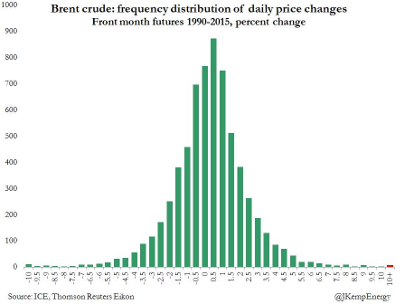
That is a 15%+ move off of the bottom – just oversold or Venezuela’s cry for an OPEC meeting a significant event?
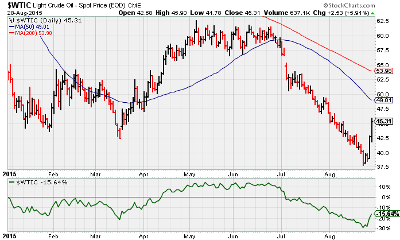
@Convertbond:
Energy as % of the S&P 500
2015: 6.9%
2011: 15.5%
Oil
2015: $39
2011: $105
Energy Sector Bulls AAII
2015: 3%
2011: 43%
We have been waiting for an M&A as a result of plunging energy prices. Schlumberger + Cameron opened our eyes…
Schlumberger Ltd., the world’s largest oil-field service company, said Wednesday it would buy smaller rival Cameron International Corp (NYSE:CAM). for $12.7 billion in cash and stock. Consolidation is expected across the energy sector as companies struggle with low oil prices and a pullback in drilling activity. The deal comes months after Schlumberger’s two biggest competitors, Halliburton (NYSE:HAL) Co. and Baker Hughes (NYSE:BHI) Inc., agreed to combine. That $35 billion deal is still undergoing regulatory review…
The combination of Schlumberger (NYSE:SLB) and Cameron (NYSE:CAM), two of the best known names in oil-field services, will create an energy technology powerhouse, executives from the two companies said Wednesday during a conference call. Schlumberger’s expertise is focused underground, helping companies find new oil and gas reserves and coax more fuel out of existing discoveries. Cameron creates the equipment that sits on the surface at the top of a well, and is perhaps best known as the maker of a piece that malfunctioned and helped trigger the 2010 Deepwater Horizon oil spill disaster. It settled with BP (LONDON:BP), the well’s operator, for $250 million. Cameron later benefited from new regulations on oil wells as companies upgraded their equipment in the wake of the disaster.
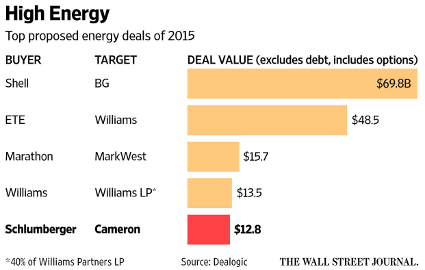
Berkshire Hathaway (NYSE:BRKa) even announced a 10% stake in Phillips 66 (NYSE:PSX). But because PSX is more of a refiner, you really can’t say that is a bet on higher oil prices…
Warren Buffett’s Berkshire Hathaway Inc disclosed a $4.48 billion stake in oil refiner Phillips 66, rebuilding a bet it had made in the energy industry before oil prices fell. The 57.98 million-share, or roughly 10.8 percent, stake was revealed in a Friday night filing with the U.S. Securities and Exchange Commission. Phillips 66 shares closed Friday at $77.23.
Given the new lows in Crude Oil, how much more should the average American expect to save from driving costs?
A fall in fuel prices is expected to save U.S. consumers about $90 per household per month by the end of the year, providing a boost to spending power and economic growth. US crude oil prices have fallen from about $60 per barrel in late June to $38 on Monday, a decline that is set to drive retail petrol prices down below $2 per U.S. gallon, their lowest since early 2009. The weakness of oil prices is creating a countervailing force to the drag on the economy resulting from turbulence in world stock markets. U.S. petrol prices will also be reduced in the coming months by a shift to cheaper blends from the more expensive varieties mandated by regulators during the summer, a slowdown in demand after the holiday driving season ends in early September, and a resumption of production at BP’s Whiting refinery in Indiana.
Quote of the week as the State of Illinois elects to start paying lottery winners in IOUs…
“Our government is committing a fraud on the taxpayers, because we’re holding ourselves out as selling a good, and we’re not — we’re not selling anything. The lottery is a contract: I pay my money, and if I win, you’re obligated to pay me and you have to pay me timely. It doesn’t say if you have money or when you have money.”
(Illinois State Rep. Jack Franks)
For Christmas, the NFL will be getting its own version of ‘Blackfish’. Wonder if Sony Pictures will be advertising it on Sundays?
The information presented here is for informational purposes only, and this document is not to be construed as an offer to sell, or the solicitation of an offer to buy, securities. Some investments are not suitable for all investors, and there can be no assurance that any investment strategy will be successful. The hyperlinks included in this message provide direct access to other Internet resources, including Web sites. While we believe this information to be from reliable sources, 361 Capital is not responsible for the accuracy or content of information contained in these sites. Although we make every effort to ensure these links are accurate, up to date and relevant, we cannot take responsibility for pages maintained by external providers. The views expressed by these external providers on their own Web pages or on external sites they link to are not necessarily those of 361 Capital.
